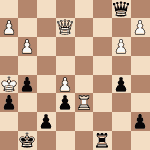Chess endgames with passed pawns have many principles. A previous article explained the opposition. In this article, a game between two top grandmasters demonstrates two other principles: passed pawns must be pushed and the square of the pawn.
Pawn Endgame Principles
In a previous article, the opposition was discussed. Like the principles in today’s article, the opposition often is relevant when there is a passed pawn. By definition, a passed pawn has no enemy pawns blocking its file or located on adjacent files. In an endgame with just kings and pawns, kings are often tasked with stopping passed pawns from promoting.
Taking the opposition is one way for a defending king to stop the promotion of a passed pawn, but it is not the only way. Sometimes, a defending king may get inside the square of the pawn. A video, by International Master Andrey Ostrovskiy, explains the square of the pawn.
The square of the pawn shows whether a defending king can capture a passed pawn, either as it races toward promotion or is on the promotion square. The square of the pawn is a faster alternative to calculating, “If my opponent moves their pawn, I move my king, they move their pawn, I move my king, they move their pawn” and so forth.
Mechanics’ Institute Chess Café

After chatting about the latest chess news at the Mechanics’ Institute Chess Café, participants learn from the games and puzzles presented every Monday. I have written about the Mechanics’ Institute Chess Café before; for example see this link. The Chess Café is held over Zoom, so participants attend from all over the world.
At each week’s Chess Café, National Master Mike Walder usually presents one of his latest games and one or more puzzles. On September 18, 2023, Walder presented the position diagrammed below. After he told us “Black to move,” Chess Café participants tried many wrong moves. But we finally got it right, thanks to Chess Café leader FIDE Master Paul Whitehead.
Radjabov versus Fedoseev
The position Walder presented is from a 2019 game between Grandmasters Teimour Radjabov and Vladimir Fedoseev.
